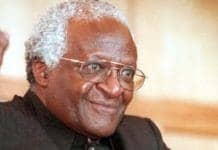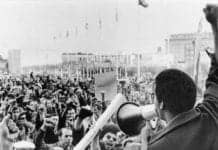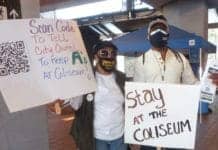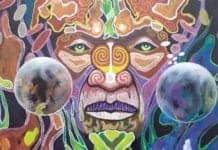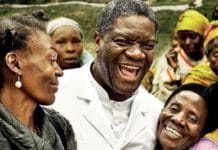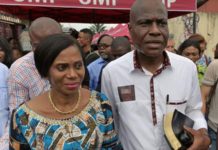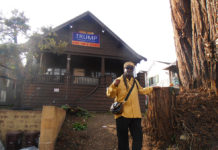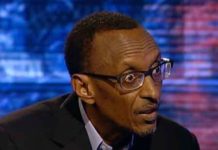Ann Garrison speaks with Maurice Carney
Broadcast in its full length on AfrobeatRadio, WBAI, 99.5 FM in New York City and wbai.org, on Aug. 20, 2011, and on The Morning Mix, KPFA, 91.4 FM in Berkeley and kpfa.org, on Sept. 3, 2011; both stations are part of the Pacifica Radio Network.
Transcript
AfrobeatRadio/Ann Garrison: Presidential polls are approaching on Nov. 28 in the Democratic Republic of the Congo, but few observers expect them to be free or fair. The country’s Parliament has changed the Constitution to favor sitting President Joseph Kabila with one round or winner-take-all voting, in which opposition candidates would be expected to divide the opposition vote, leaving Kabila with the most votes and no run-off to face.

How can the Congolese people claim Congo’s vast resources and defend the claim?
AfrobeatRadio spoke to Maurice Carney, executive director of Friends of the Congo who believes that Congo, like the rest of resource-rich Africa, should look to the Global South, to Bolivia, Ecuador, Venezuela and Brazil for models and allies in asserting resource sovereignty.
AfrobeatRadio/Ann Garrison: Maurice Carney, you’ve said that the real story may be after the election in November. Could you explain?
Maurice Carney: Yes, the current regime headed up by Joseph Kabila will not easily release power if the votes go against them, and the votes are not likely to go against them because they’ll use the resources of the state to make sure that an electoral victory goes their way.
Now, as we have seen with the increasing crowds that are attending the rallies held by Etienne Tshisekedi and proclamations coming from Tshisekedi that he believes he can win the election outright … should Kabila remain in power, it’s probable that those crowds that are mobilized to support Tshisekedi may also be mobilized to go into the streets.
So, as observers of the Congo, as allies of the Congolese people, we ought to watch the situation very carefully for potential post-election disruption, should Kabila wind up “winning” and the Tshisekedi forces remain mobilized and in the streets.
AfrobeatRadio: Yesterday you said that whatever sort of candidate Tshisekedi is, an honest election would be a victory for the people.
Carney: Well, yes, what I was saying is that in the Congo, one of the challenges has been ascension to power. Leaders have ascended to power by fiat, by coup, and the degree to which power can be acquired in a peaceful way through, in this case, election, the process, the process going forward would be a benefit to the people. So as long as the people believe that there was a fair process, an open process, a transparent process, then that bodes well for the future of the country.

AfrobeatRadio: You also said that there isn’t really an organized popular movement to support any one candidate after an election.
Carney: No, especially if you use the standard, I believe we’re talking in the context of Latin America. If we use the standards of Bolivia, for example, or Brazil or even Venezuela, all we have to do is look to 2002 in Venezuela when there was a coup and Chavez was removed from power. It was the organized masses that came out in the streets and demanded the return of the leader that they elected and put in power, and that organized mass changed the equation to the point where Chavez was put back in power.
That type of organized national movement does not exist in the Congo, and understandably so, because Congo has gone through, over the last 50 years, assassinations, dictators, wars, invasions. All have worked to weaken the institutions in the Congo and those institutions that would form the foundation for such an organized movement – institutions such as labor, women’s groups, students groups, across the board civil society.
So that’s one of the biggest challenges facing the Congo in the near and long term future – that is, to develop institutions that are strong enough to protect the interests of the people, such as we see happening in Bolivia or happening in Venezuela and Ecuador and Brazil. Those institutions among the people are strong enough to protect their interests.
That’s what the Congolese people in particular and Africans in general have to aspire to, in looking South, to see what their fellow people of color are doing in the Southern Hemisphere – the models of Bolivia, the models of Ecuador and Peru and Brazil and Venezuela. These are models for Africans to aspire to.
It’s a new day in Latin America, where the interests of the people are beginning to be served, where the resources of those countries are beginning to be owned by the people, so it would behoove Africans to draw lessons from what’s happening in Latin America and apply those lessons to the situations on the African Continent. And probably no other country needs those kinds of lessons more than the Congo because it’s so central to the African Continent, and whatever happens there reverberates throughout the continent.
It’s a new day in Latin America, where the interests of the people are beginning to be served, where the resources of those countries are beginning to be owned by the people, so it would behoove Africans to draw lessons from what’s happening in Latin America and apply those lessons to the situations on the African Continent.
AfrobeatRadio: Given the winner take all, one round scenario that we’re looking at for the Congo election, how important do you think it is for the opposition to unite around one candidate? Lots of people are calling for that.
Carney: Well, to the degree that we … how can I say … leave certain elements to the side. Remember, even if the opposition wins the election, we’re still talking about a country that’s on the edge, a country that’s owned by multinational corporations, a country that responds and is a victim of dictates from foreign governments in Europe and America.

Now that being said, within that narrow confine of what we call elections, it would certainly increase the chances of the opposition were they to unify behind one candidate, but I’m not even sure that’s efficient because you can bet – now I’m not a prognosticator, but you can bet and reasonably conclude, Ann – that the power structure in Kinshasa and the foreign governments and foreign corporations that back them are going to make sure that Joseph Kabila wins this election, or it can be said that he wins the election, because Kabila is their man, and he’s their man because he’s provided unfettered access to Congo’s resources. And the Western powers and foreign governments, multinational corporations do not want to see anybody come in that could potentially overturn contracts that have been put in place that facilitate the extraction of tens of billions of dollars from the Congo to Western investors.
Western powers and foreign governments, multinational corporations do not want to see anybody come in that could potentially overturn contracts that have been put in place that facilitate the extraction of tens of billions of dollars from the Congo to Western investors.
AfrobeatRadio: That sounds really grim, but how can you imagine a people’s movement like those that are restoring some of the wealth and resources of the Global South and Latin America to the people arising in Congo? How can you imagine that?
Carney: It will be a long slog and it will come from the youth who are organizing now with full understanding of the geopolitical dynamics that are at play in the Congo and what is at stake. It’s not going to be something that’s going to happen overnight. But if you don’t have a vision for a new Congo where the Congolese people are organized and mobilized, then you might as well just give up.
And the Congolese people, the youth, are not of the mindset that they’re going to give up on this situation. They’re fighting day and night. They’re educating their peers. They’re educating their communities. And they’re mobilizing throughout the country to bring about change whether the change comes today or it comes tomorrow. They’re clear that they have to be organized in order to protect their interests and no one, no one, can protect their interests like they can.
And the first step is for the Congolese people in particular, but people on the African continent, is to look for their solutions to the Global South, because it’s the Global South that has been successful in resisting the imperial entry of the North. So first they have to have an awareness that that’s where they need to look.
Congolese youth are not going to give up. They’re fighting day and night, educating their peers, their communities and mobilizing throughout the country to bring about change, whether it comes today or tomorrow. They’re clear that they have to be organized to protect their interests, and no one, no one, can protect their interests like they can.
Although it’s symbolic and not necessarily substantive, but noteworthy, one of the Congolese presidential candidates calls himself the Lula of Congo. Now that’s obviously preposterous because Lula came out of the labor movement in Brazil and had an organized base from which he ascended to power, and no presidential candidate in the Congo has that foundation. But just the very fact that that leader is aspirational – that is to say he wants to be like Lula – that gives you an indication that people are orienting, the Congolese and Africans, at least are aware and orienting at least their vision or, as you say, their imaginations towards the Global South.
So it’s not lost on the people of Africa that Lula himself was invited when the African Union met in Equatorial Guinea this past summer and he scolded the African leaders and shared with them that they are not acting in the interest of their people and they need to start acting in the interest of their people. They need to stop dropping their pants for the West as he so eloquently put it.

And, Ann, I must add that if Congolese and Africans take those steps, they will quickly see an increase of support for their efforts from the likes of Bolivia, from the likes of Brazil, from the likes of Venezuela, from the likes of Ecuador. They will see that support coming to them in numerous ways.
So, that’s how we see that broad based organized effort can start to take root if the Congolese people in particular, Africans in general, learn from their brothers and their sisters in the Global South.
AfrobeatRadio: Well, it sounds like a good place to note that Evo Morales in Bolivia nationalized a Glencore International tin smelter in 2007 and earlier this year he initiated talks with mining unions about further nationalizing Glencore International properties mines in Bolivia. And Glencore International owns 77 percent of Katanga Mining and has been accused of all sorts of human rights abuse and anti-labor aggression in Congo.
Carney: Yes, absolutely, and what we see with Glencore, in fact: Glencore went in to save Katanga Mining because there was a period there at the start of the economic crisis where the commodities had taken a dive and Katanga Mining, owned by Belgian George Forrest and also partly owned by Israeli Dan Gertler, and Forrest and Gertler are two of the major, what you would call, barons in the Congo. That is to say they have a tremendous influence on what happens in regard to leadership in the Congo. So Glencore came in and rescued Katanga Mining and, as you so rightly pointed out, it’s the classic case of where the wealth of a country is really being traded between external forces.
Now, in terms of Bolivia and the nationalization, we see murmurings of that kind of talk, not necessarily coming out of Congo, but certainly coming out of South Africa with the young ANC (African National Congress) youth leader Julius Malema, who has articulated a need for the resources to be owned by the people. So here, as I stated earlier, where we’re going to see the change in terms of breaking with the old order, it’s going to come from the youth of Africa, and Julius Malema is a classic example of that with his articulation of the need of the people to benefit from their resources.
ANC youth leader Julius Malema has articulated a need for the resources to be owned by the people.
So again, we see examples, and it’s just a question of building on those examples to the point where a critical mass is reached on the African continent, where the people finally control and determine their own affairs and assume ownership of their resources for their benefit and not the way it is right now, where it’s benefiting external powers.
AfrobeatRadio: You know I’m glad you brought up South Africa because South Africa’s mineral wealth is comparable to Congo’s, more than any other country in Africa. South Africa’s mineral wealth is comparable to Congo’s, no?
Carney: Yeah, I mean … in relation to Congo you have South Africa and you have Angola and you have Guinea. They call Guinea little Congo. Just across the board, Nigeria of course with its tremendous oil wealth. Wherever you turn on the continent, it’s just flush with natural wealth.
AfrobeatRadio: Let’s not forget Sudan right now.
Carney: Oh, Sudan! As I say, wherever you go, it’s remarkable the wealth that’s on the continent. So yes, South Africa is certainly, you can say, comparable even though Congo just dwarfs every country on the continent.
AfrobeatRadio: So who was the leader you were describing in South Africa, the young leader?
Carney: He is the head of the ANC and he is the youth leader of the ANC, Julius Malema.
AfrobeatRadio: And so this sounds like an effort to push beyond what was achieved by the abolition of apartheid.
Carney: Oh, absolutely. Absolutely. Absolutely. Absolutely, because even in the current situation of the people, they’re suffering, in terms of high unemployment, poor health, lack of housing, lack of participation in the wealth of the country and ownership of the wealth of the country. People in South Africa are suffering tremendously, and the youth, who are usually the vanguard of any movement, are aware and conscious of this and are calling for radical changes that are different from the leadership of the elders and the African National Congress.

AfrobeatRadio: It’s heartening to hear about that because I hear a lot of depression and cynicism about the consequence of apartheid, about it not really improving the living standards of most Black South Africans.
Carney: There are some spectacular statistics out there as it relates to the life expectancy, for example. It has gone down from the apartheid era. Now a lot of that is surely due to the AIDS epidemic that has hit South Africa, but across the board there is some really spectacular data that deals with the standard of living and how it has not improved much for the masses of the people.
Of course for a certain Black elite there has been tremendous improvement but, as you know, within the capitalist model, it allows a few to benefit and those few that benefit are held up as the example to follow and the masses are looked upon and say well, if only you follow the path of those that we hold up as your model, you can be like them too. But we know that’s a game that’s played to keep people pursuing an unattainable goal.
So the young people that are organized, particularly within the ANC, are looking to change that dynamic where the masses actually get access to the resources of the wealth of the country and benefit from it. And that’s best exemplified and represented in the articulation of Julius Malema.
So the young people that are organized, particularly within the ANC, are looking to change that dynamic where the masses actually get access to the resources of the wealth of the country and benefit from it. And that’s best exemplified and represented in the articulation of Julius Malema.
AfrobeatRadio: There was actually a neoliberal wave of privatization after apartheid, wasn’t there?
Carney: Well, I don’t even want to say after apartheid. If you read Naomi Klein’s work, “The Shock Doctrine,” she talks about it. She has a chapter in there that deals with the negotiations leading up to the end of apartheid and how it is that the economic power structure – economic power structure both inside South Africa and outside South Africa – were assured, through Thabo Mbeki, because he was primarily responsible for negotiating some of the economic dynamics at the time, that there wouldn’t be any radical change. For example, the ANC wouldn’t hold to the tenets of its charter, which called for resource sovereignty.
Even after Mandela and after Mbeki, when Jacob Zuma, who was supposed to be more of a populist, was evident that he was going to come to power, he had talks with companies at the time like Merrill Lynch and reassured the financial markets that under his leadership there wouldn’t be any radical change in the economic order and that business would go on as usual. So that’s been consistent from Mandela to Mbeki and now to Zuma. Now what comes after Zuma, there may be some uncertainty there, especially if the youth of South Africa have their way.
Even after Mandela and after Mbeki, when Jacob Zuma, who was supposed to be more of a populist, was evident that he was going to come to power, he had talks with companies at the time like Merrill Lynch and reassured the financial markets that under his leadership there wouldn’t be any radical change in the economic order and that business would go on as usual.
The thing is, Ann, and it’s always important to remember, these commodities markets and people from the North, they need those resources more than Morales needs them. They have entire industries that are based upon getting cheap resources, so they’re in a stronger position than one would normally think.

As a citizen of the state of California, I’d like to add that our problems out here are not a lot different, as our public schools, universities, courts and health and human services suffer crippling cutbacks and big oil continues to extract California’s oil and natural gas without even paying a severance tax at the wellhead. An archive of today’s program can be found at afrobeatradio.net and sfbayview.com.
For Pacifica, WBAI and AfrobeatRadio, I’m Ann Garrison.
Nationalize mines and banks, says South Africa’s Julius Malema
KPFA Weekend News broadcast Sept. 5, 2011
Transcript
KPFA Weekend News Host Anthony Fest: And turning now to Southern Africa, South Africa’s ruling African National Congress stated yesterday that it has adjourned the disciplinary hearing against the African National Congress Youth League president, 30-year-old firebrand Julius Malema, until next Sunday. The ANC has accused Malema of “sowing divisions” within the ANC and bringing the party into disrepute by calling for overthrow of the government of neighboring Botswana.
Many observers note, however, that the ANC’s real issues with Malema are the threat he poses to ANC President Jacob Zuma and his radical advocacy for the nationalization of mines and banks and the seizure of land still largely owned by Africa’s white minority. KPFA’s Ann Garrison has that story.
KPFA/Ann Garrison: Alex Duvall Smith, writing in the London Guardian said that Julius Malema’s call for the overthrow of Botswana is “a limp charge that no one really cares about, but it spares Malema’s enemies from publicly addressing the real issues at the heart of the showdown.” The issues that really scare the ANC, he says, are Malema’s calls for nationalization of the mining sector and confiscation of white-owned land. Here’s Malema speaking to the African National Congress Youth League Conference in June:
Malema: Nationalization of mines is a resolution of this Congress, so perhaps we’ll hear very minimal of Malema’s policy on nationalization, because now it’s not Malema. Five thousand plus, coming from many, many branches all over South Africa.
Nationalization is the policy of the Youth League. We may not agree with the method used in Zimbabwe, but the critical issue is result. Land question.

We want land. Without land we are nothing. Why would this South Africa belong to us when we have nothing to show that this South Africa belongs to us?
KPFA: Ayanda Kota, chairperson of South Africa’s Unemployed People’s Movement, wrote in July in the Mail and Guardian that poor South Africans should appreciate Malema’s call in raising the issues of nationalization and the land question and that they cannot continue on the path of the past 17 years, which has made the rich richer and the poor poorer.
But Kota also says that the ANC is not a poor people’s organization. He writes that Malema himself is already a very wealthy man, thanks to corruption within the party, and that nationalizations led by Malema will only lead to more of the same. The movement to claim South African resources for its people must, he says, be led by poor and working people’s organizations.
Maurice Carney, executive director of Friends of the Congo, nevertheless says that Malema, as a resource nationalist, has sounded a call to Congo and the rest of Africa, where revenue is generated primarily through resource extraction, and foreign investors in multinational corporations are the principle beneficiaries.
Maurice Carney: The young ANC youth leader Julius Malema has articulated a need for the resources to be owned by the people. Where we’re going to see the change in terms of breaking with the old order – it’s going to come from the youth of Africa. And Julius Malema is a classic example of that, with his articulation of the need for people to benefit from their own resources.
KPFA: For Pacifica, KPFA and AfrobeatRadio, I’m Ann Garrison.
San Francisco writer Ann Garrison writes for the San Francisco Bay View, Global Research, Colored Opinions, Black Star News, the Newsline EA (East Africa) and her own blog, Ann Garrison, and produces for AfrobeatRadio on WBAI-NYC, Weekend News on KPFA and her own YouTube Channel, AnnieGetYourGang. She can be reached at ann@afrobeatradio.com.

 Store
Store



